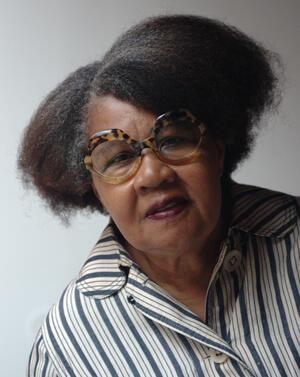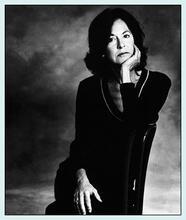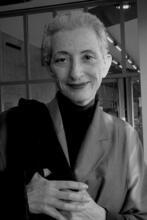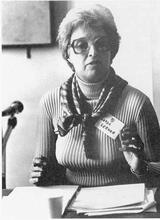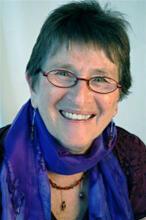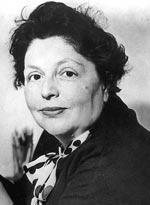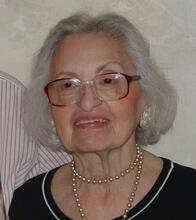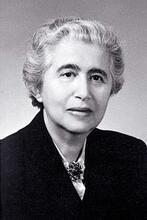Jamaica Kincaid
Jamaica Kincaid is a Jewish Afro-Caribbean author, born in Antigua while it was still under British colonial rule. Her given name was Elaine Cynthia Potter Richardson. For economic reasons, her family sent her at the age of sixteen to work as an au pair in the United States, where she has resided ever since. She began publishing her writing in 1973 and has published a dozen books as well as many uncollected essays.
Introduction
Jamaica Kincaid was born Elaine Cynthia Potter Richardson on May 25, 1949, in St. John’s Antigua, a Caribbean island colonized by the British. Kincaid is a prolific writer and political thinker whose work stands out in any study of Africana, Caribbean and African American, or African Diaspora literature. A convert to Judaism, the central themes in her writing are the ravages of colonialism and imperialism, migration and diaspora, mother-daughter relationships, love and sexuality, and exile and loss, all of which are also perennial Jewish themes. The extensive literature on Kincaid lacks attention her Jewishness and to Jewish issues in her work, which contains traces of interwoven experiences of her Jewish feminist sensibility and her situation as a survivor of colonial subjugation.
Biography
Kincaid was raised Christian and in relative poverty by her mother and stepfather. An excellent student who loved literature, she had the ambiguous experience of having the best of an island British colonial education. The birth of her three younger brothers created a rift with her mother, given a shift in her mother’s focus on the boys’ needs. As a gendered manifestation of her situation as a poor and female colonial subject, in 1966, at the age of seventeen, prior to her earning her high school diploma, Kincaid was sent to New York to work as an au pair, separating her from her family back home for many years.
Having earned her High School General Equivalency Degree during her time in New York City, Kincaid was awarded a full scholarship to the then recently opened and short-lived Franconia College in New Hampshire. She attended school there for about a year in the late 1960s and never earned a college degree. She later earned honorary degrees from numerous universities.
In 1973, when she began to publish her writing, she changed her name to Jamaica Kincaid primarily because of her family back home’s disapproval of her writing. She wrote for The Village Voice and Ingénue, with her early short fiction published in The Paris Review and The New Yorker. Kincaid became a staff writer at The New Yorker in 1976 and stayed for twenty years; she was a featured columnist for the New Yorker’s Talk of the Town for nine years. An award-winning writer, Kincaid has published numerous books, including fiction, non-fiction, works on gardening, and a children’s book. She has also published many article-length works of fiction and non-fiction. Her anti-capitalist non-fiction work on neo-colonialism in A Small Place, written as an indigenous islander to the masses of global northern tourists who come to the islands to “get away,” was woven into the narrative of Stephanie Black's 2001 documentary, Life and Debt. Kincaid has been a finalist for and/or won a stream of prestigious national and international awards for her writings bringing forth Caribbean tableaus and sensibilities.
In 1979, Kincaid married composer and Bennington College professor Allen Shawn, son of The New Yorker editor William Shawn, with whom she had had a productive professional relationship. After living mainly in New York City, she lived for many years with Shawn in Bennington, Vermont, where she and Shawn had two children, Harold and Annie. Kincaid and Shawn divorced in 2002. In her years living and writing from Vermont, Kincaid held a position as Professor of African and African American Studies in Residence at Harvard University. Active in Jewish communities, she served for a time as president of her synagogue in Vermont and has been featured prominently in Jewish news publications.
Diaspora and Anti-Colonialism
Kincaid’s writing is semi-autobiographical, and her focus on colonialism helps deepen Jewish studies on the diasporic condition. Kincaid shares with readers what it is like being displaced, in a clear and embodied experience of diaspora life in exile. According to Kincaid, the cultural imperialism involved in the colonial project robbed her of her capacity for independent sense making, a faculty she considers necessary to the development of agency that might facilitate productive resistance strategies. Kincaid’s critique of colonialism mirrors parallel facets of diasporic phenomena, particularly Jewish ones. Kincaid’s experience as an immigrant to the United States who converted to Judaism as an adult broadens a common Jewish study of the diaspora with her explicit critique of the centrality of colonialism to diaspora.
While Jewish political thinking has long focused on the realities and concept of diaspora, rarely has Jewish diaspora thinking in the contemporary period incorporated insights from a critique of colonialism. The lack of a critical awareness of colonialism is a gap in Jewish discourse, contributing to a less than full ability to recognize broader contexts of power in Jewish diasporic trajectories. Diasporas are almost always created out of circumstances similar to, and often the same as, what are more commonly understood as colonial.
The term “diaspora” is connected inherently to both colonial and Jewish phenomena. The word diaspora was originally used by the ancient Greeks to reflect the experience of colonizers sent to rule over an indigenous population following an imperial victory. Only after the creation of the Jewish diasporas of antiquity was the Greek term used to reflect the experience of the subjects of inquisition, those forced out of their homelands by foreign conquerors. Kincaid’s work proves a fertile beginning for bringing together anti-colonial critique and diaspora studies in a Jewish frame.
Literary Method as Politics
Kincaid’s method resonates with modes of resistance central to Jewish feminist consciousness. Like the midwives of Exodus, who defy the Egyptian Pharaoh’s decree to kill Jewish newborn males, her mode is to stand up to the mightiest power source of her experience. Her method inspires and instructs us in how to speak truth to power. Kincaid’s methodology as a writer is, and enacts, a politics.
Key to Kincaid’s method is to start with power dynamics, calling into question the position of the dominant and attending to the view of the less powerful. In speaking from this position of the dominated, she makes those at the margins, their experiences and knowledges, primordial—of the first order. Kincaid’s method teaches us to turn history on its head for a new view, one better equipped to answer to questions of justice, even if with despair. Kincaid writes that the stories of glory taught in her colonial education “never end well” for her, the colonial subject. Most recorded histories of empire come at the expense of her and her history.
In full length works such as A Small Place and in essays such as “On Seeing England for the First Time” (telling of her first visit to the colonial power), Kincaid demonstrates how her method derives from and enacts a politics. In these works, Kincaid tells the stories of the people who make the canonical tales and realities of colonial empire building possible: the laborers, the colonized, the women. She turns the unseen not only into the seen, but also into the subjects of the story. In doing, so she re-orients us from the victors to the spoils of history so that we might be able to undertake a reckoning. This is part of the process of holding those responsible for the “spoiling” accountable for their position in historic events of subjugation.
Text in Colonial and Jewish Diasporic Cultures
Broadly, “texts” serve a number of similar functions in the post-colonial critique developed in Kincaid’s body of work, as well as for many in diaspora, Jewish and otherwise. While different texts are primary to different Jewish communities, some texts are central for most Jews in diaspora. While no text is quite as central to colonial life as something like the Jewish bible or Talmud, in Kincaid’s rendering there certainly are central texts of colonial education, both “vivid” and “subtle.” Like Kincaid, many Jewish feminists struggle with Jewish historic texts, their role in gender and co-constructed oppressions, as well as their emancipatory potential.
Especially in early works such as Annie John and Lucy, Kincaid explores how the texts of her colonial education forced into her view specific knowledges, vividly portrayed, for example of the lives of British Kings. Even more destructive than the hard facts in the texts, Kincaid writes, were the subtleties of imagery, resounding with experiences of her colonial past as well as those in diaspora. Texts functioned here as key parts of the political context of colonial circumstance. Central to the strategies of her subjugation was that in the truth texts of her British colonial education, the facts of imagery and metaphor did not correspond to her lived reality. This practice negated Kincaid’s lived imaginary and its meanings and undid her personhood. At the same time, Kincaid is clear that the texts of her colonial British education in Antigua also played a central role in her becoming a critical thinker, one able over her lifetime to engage in individual and collective processes of self-fulfillment and justice.
Forgetting/Not Learning the Lesson
Under the colonial view, not learning the ruler’s version of the truth makes one less worthy and becomes part of the justification for oppression. In a resistive move, Kincaid inverts the colonial view, noting that it was a blessing that she never learned to draw the map of England properly. The double-edged sword of using the masters’ tools to dismantle the master’s house is crucial to acknowledge in the many ways that learning the masters’ lessons often requires unlearning the ways of one’s own people. The colonized often must work to “forget” the lessons they learned from the colonizers as part of the work of expunging colonial rulers, to take back or create anew their capacities for self-determination in the home place.
Kincaid stands in a long line of African critical thinkers in the Americas, focusing on the need for conquered subjects to develop a double consciousness—one in which they learn the ways of the masters in order to survive in the masters’ world, yet also learn the ways of their own people to protect and build spaces of freedom as a conquered population. Here, Kincaid notes the nearly holy good fortune—the blessing—of never having learned the colonial texts, the colonizers' versions of the truth, accurately. Never really learning the lessons of one’s history and culture from within the location of the colonized place is a loss—especially if due to violence, both physical and that of cultural imperialism. Still, not learning the colonial cultural versions of truth can also aid us when we seek to access our own/non-colonized texts and their varied truths in order to resist modalities of our conquest.
Often those in diaspora face similar challenges. Developing cultural fluency in one’s histories, texts, and languages is fraught with tensions under the pressure to learn and function in the dominant cultural frame. Syncretism, the influence of new cultures on one’s own, can often enliven one’s culture. How much and in what ways is it best to learn the modes of the place of living, in order to function, to survive, to learn the rules of the game in order to lessen oppression, to inspire new depths in a diaspora community’s culture? Kincaid demonstrates how we might determine what is best not to learn, what and how to unlearn aspects of dominant culture in the place of living for those in diaspora.
For those in diaspora, the politics of forgetting are equally complex. Many aspects of one’s home culture may be worthy of discarding. How can we let go with agency when the oppressive context of our lives in diaspora requires forgetting? Kincaid’s work shows that it is largely a matter of distillation. How do we come to clarity about what might be best to forget among the truths learned/forced upon us in diaspora, especially when we have been schooled from our diasporic communities to think that adherence to such truths is crucial to our very survival among the hosts of our exile? Kincaid helps us to see that when done in empowering ways, the process itself is indeed a blessing. She reminds those of us in diaspora, as well as the colonized, that the fruits of the labor can be blessings as well.
Selected Works by Jamaica Kincaid
At the Bottom of the River. New York, NY: Farrar, Straus and Giroux, 1983.
Annie John. New York, NY: Farrar, Straus and Giroux, 1985.
Annie, Gwen, Lilly, Pam, and Tulip. New York: Library Fellows of the Whitney Museum of Modern Art, 1986.
A Small Place. New York, NY: Farrar, Straus and Giroux, 1988.
Lucy. New York, NY: Farrar, Straus and Giroux, 1990.
The Autobiography of My Mother. New York, NY. Farrar, Straus and Giroux, 1996.
My Brother. New York, NY: Farrar, Straus and Giroux, 1997.
My Garden (Book). New York, NY: Farrar, Straus and Giroux, 1999.
Talk Stories. New York, NY: Farrar, Straus and Giroux, 2001.
Mr. Potter. New York, NY: Farrar, Straus and Giroux, 2002.
Among Flowers: A Walk in the Himalayas. Washington DC: National Geographic, 2005.
See Now Then. New York, NY: Farrar, Straus and Giroux, 2013.
Selected Interviews with Jamaica Kincaid
Garner, Dwight. “Jamaica Kincaid.” Salon, January 13, 1996. Accessed July 31, 2016. http://www.salon.com/1996/01/13/kincaid_2/
Kincaid, Jamaica. “In Conversation: A Conversation with Jamaica Kincaid.” Interview by Loh, Alyssa. The American Reader, 2013. Accessed July 31, 2016. http://theamericanreader.com/a-conversation-with-jamaica-kincaid/
Kincaid, Jamaica. “Interview with Jamaica Kincaid.” Interview by Kay Bonetti. Missouri Review, Issue 25.2 (Summer 2002): “Uncovered.” Accessed July 31, 2016. http://www.missourireview.com/archives/bbarticle/interview-with-jamaica…
Lev-Ari, Shiri. “She Doesn’t See in Black and White.” Haaretz. Last modified January 22, 2004. Accessed July 31, 2016. http://www.haaretz.com/culture/arts-leisure/she-doesn-t-see-in-black-and- white-1.111699.
Sela, Maya. “An Improbable Story, my Life.” Haaretz. June 16, 2010. Accessed July 31, 2016. http://www.haaretz.com/weekend/week-s-end/an-improbable-story-my-life-1….
Selengut, Suzanne. “Reluctantly Labeled.” The Jerusalem Post. May 17, 2006. Accessed July 31, 2016. http://www.jpost.com/ArtsAndCulture/Books/Article.aspx?id=22042.
“Jamaica Kincaid and the Modernist Project: An Interview.” (Callaloo, no. 39, 1989, pp. 396–411)
Weisberg, Jessica. “Jamaica Kincaid is Still Jewish. Tablet. February 5, 2015. Accessed June 1, 2020. http://www.tabletmag.com/jewish-arts-and-culture/books/123309/jamaica-k…
Brettschneider, Marla. “Jamaica Kincaid’s Political Thinking.” 51 Key Feminist Thinkers, edited by Lori Marso. New York: Routledge, 2016.
Brettschneider, Marla. “Kincaid, Diaspora, and Colonial Studies.” African Zion: Studies in Black Judaism, edited by Edith Bruder and Tudor Parfitt. Cambridge: Cambridge Scholars, 2012.
Brettschneider, Marla. “Jewish Feminists and New Diaspora Theorizing: The Life and Work of Jamaica Kincaid,”in Jewish Feminism and Intersectionality. Albany, NY: State University of New York Press, 2016.

